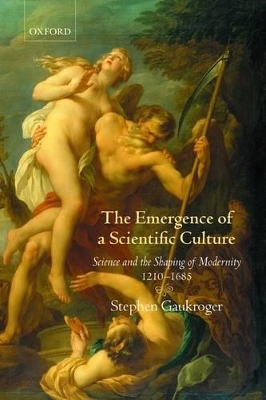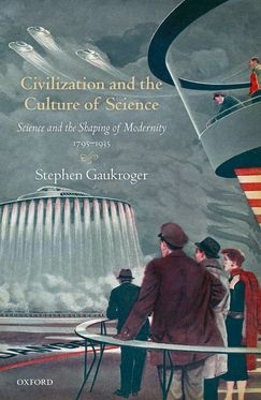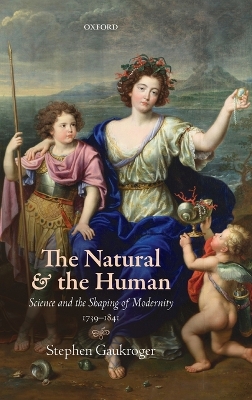Science and the Shaping of Modernity
4 total works
Why did science emerge in the West and how did scientific values come to be regarded as the yardstick for all other forms of knowledge? Stephen Gaukroger shows just how bitterly the cognitive and cultural standing of science was contested in its early development. Rejecting the traditional picture of secularization, he argues that science in the seventeenth century emerged not in opposition to religion but rather was in many respects driven by it. Moreover, science
did not present a unified picture of nature but was an unstable field of different, often locally successful but just as often incompatible, programmes. To complicate matters, much depended on attempts to reshape the persona of the natural philosopher, and distinctive new notions of objectivity and
impartiality were imported into natural philosophy, changing its character radically by redefining the qualities of its practitioners.
The West's sense of itself, its relation to its past, and its sense of its future, have been profoundly altered since the seventeenth century, as cognitive values generally have gradually come to be shaped around scientific ones. Science has not merely brought a new set of such values to the task of understanding the world and our place in it, but rather has completely transformed the task, redefining the goals of enquiry. This distinctive feature of the development of a scientific culture in
the West marks it out from other scientifically productive cultures. In The Emergence of a Scientific Culture, Stephen Gaukroger offers a detailed and comprehensive account of the formative stages of this development--and one which challenges the received wisdom that science was seen to be
self-evidently the correct path to knowledge and that the benefits of science were immediately obvious to the disinterested observer.
did not present a unified picture of nature but was an unstable field of different, often locally successful but just as often incompatible, programmes. To complicate matters, much depended on attempts to reshape the persona of the natural philosopher, and distinctive new notions of objectivity and
impartiality were imported into natural philosophy, changing its character radically by redefining the qualities of its practitioners.
The West's sense of itself, its relation to its past, and its sense of its future, have been profoundly altered since the seventeenth century, as cognitive values generally have gradually come to be shaped around scientific ones. Science has not merely brought a new set of such values to the task of understanding the world and our place in it, but rather has completely transformed the task, redefining the goals of enquiry. This distinctive feature of the development of a scientific culture in
the West marks it out from other scientifically productive cultures. In The Emergence of a Scientific Culture, Stephen Gaukroger offers a detailed and comprehensive account of the formative stages of this development--and one which challenges the received wisdom that science was seen to be
self-evidently the correct path to knowledge and that the benefits of science were immediately obvious to the disinterested observer.
Understanding the emergence of a scientific culture - one in which cognitive values generally are modelled on, or subordinated to, scientific ones - is one of the foremost historical and philosophical problems with which we are now confronted. The significance of the emergence of such scientific values lies above all in their ability to provide the criteria by which we come to appraise cognitive enquiry, and which shape our understanding of what it can achieve.
The period between the 1680s and the middle of the eighteenth century is a very distinctive one in this development. It is then that we witness the emergence of the idea that scientific values form a model for all cognitive claims. It is also at this time that science explicitly goes beyond technical expertise and begins to articulate a world-view designed to displace others, whether humanist or Christian. But what occurred took place in a peculiar and overdetermined fashion, and the outcome in
the mid-eighteenth century was not the triumph of 'reason', as has commonly been supposed, but rather a simultaneous elevation of the standing of science and the beginnings of a serious questioning of whether science offers a comprehensive form of understanding.
The Collapse of Mechanism and the Rise of Sensibility is the sequel to Stephen Gaukroger's acclaimed 2006 book The Emergence of a Scientific Culture. It offers a rich and fascinating picture of the development of intellectual culture in a period where understandings of the natural realm began to fragment.
The period between the 1680s and the middle of the eighteenth century is a very distinctive one in this development. It is then that we witness the emergence of the idea that scientific values form a model for all cognitive claims. It is also at this time that science explicitly goes beyond technical expertise and begins to articulate a world-view designed to displace others, whether humanist or Christian. But what occurred took place in a peculiar and overdetermined fashion, and the outcome in
the mid-eighteenth century was not the triumph of 'reason', as has commonly been supposed, but rather a simultaneous elevation of the standing of science and the beginnings of a serious questioning of whether science offers a comprehensive form of understanding.
The Collapse of Mechanism and the Rise of Sensibility is the sequel to Stephen Gaukroger's acclaimed 2006 book The Emergence of a Scientific Culture. It offers a rich and fascinating picture of the development of intellectual culture in a period where understandings of the natural realm began to fragment.
How did science come to have such a central place in Western culture? How did cognitive values-and subsequently moral, political, and social ones-come to be modelled around scientific values? In Civilization and the Culture of Science, Stephen Gaukroger explores how these values were shaped and how they began, in turn, to shape those of society. The core nineteenth- and twentieth-century development is that in which science comes to take centre stage in
determining ideas of civilization, displacing Christianity in this role. Christianity had provided a unifying thread in the study of the world, however, and science had to match this, which it did through the project of the unity of the sciences. The standing of science came to rest or fall on this question,
which the book sets out to show in detail is essentially ideological, not something that arose from developments within the sciences, which remained pluralistic and modular. A crucial ingredient in this process was a fundamental rethinking of the relations between science and ethics, economics, philosophy, and engineering. In his engaging description of this transition to a scientific modernity, Gaukroger examines five of the issues which underpinned this shift in detail: changes in the
understanding of civilization; the push to unify the sciences; the rise of the idea of the limits of scientific understanding; the concepts of 'applied' and 'popular' science; and the way in which the public was shaped in a scientific image.
determining ideas of civilization, displacing Christianity in this role. Christianity had provided a unifying thread in the study of the world, however, and science had to match this, which it did through the project of the unity of the sciences. The standing of science came to rest or fall on this question,
which the book sets out to show in detail is essentially ideological, not something that arose from developments within the sciences, which remained pluralistic and modular. A crucial ingredient in this process was a fundamental rethinking of the relations between science and ethics, economics, philosophy, and engineering. In his engaging description of this transition to a scientific modernity, Gaukroger examines five of the issues which underpinned this shift in detail: changes in the
understanding of civilization; the push to unify the sciences; the rise of the idea of the limits of scientific understanding; the concepts of 'applied' and 'popular' science; and the way in which the public was shaped in a scientific image.
Stephen Gaukroger presents an original account of the development of empirical science and the understanding of human behaviour from the mid-eighteenth century. Since the seventeenth century, science in the west has undergone a unique form of cumulative development in which it has been consolidated through integration into and shaping of a culture. But in the eighteenth century, science was cut loose from the legitimating culture in which it had had a public
rationale as a fruitful and worthwhile form of enquiry. What kept it afloat between the middle of the eighteenth and the middle of the nineteenth centuries, when its legitimacy began to hinge on an intimate link with technology? The answer lies in large part in an abrupt but fundamental shift in how the
tasks of scientific enquiry were conceived, from the natural realm to the human realm.
At the core of this development lies the naturalization of the human, that is, attempts to understand human behaviour and motivations no longer in theological and metaphysical terms, but in empirical terms. One of the most striking feature of this development is the variety of forms it took, and the book explores anthropological medicine, philosophical anthropology, the 'natural history of man', and social arithmetic. Each of these disciplines re-formulated basic questions so that empirical
investigation could be drawn upon in answering them, but the empirical dimension was conceived very differently in each case, with the result that the naturalization of the human took the form of competing, and in some respects mutually exclusive, projects.
rationale as a fruitful and worthwhile form of enquiry. What kept it afloat between the middle of the eighteenth and the middle of the nineteenth centuries, when its legitimacy began to hinge on an intimate link with technology? The answer lies in large part in an abrupt but fundamental shift in how the
tasks of scientific enquiry were conceived, from the natural realm to the human realm.
At the core of this development lies the naturalization of the human, that is, attempts to understand human behaviour and motivations no longer in theological and metaphysical terms, but in empirical terms. One of the most striking feature of this development is the variety of forms it took, and the book explores anthropological medicine, philosophical anthropology, the 'natural history of man', and social arithmetic. Each of these disciplines re-formulated basic questions so that empirical
investigation could be drawn upon in answering them, but the empirical dimension was conceived very differently in each case, with the result that the naturalization of the human took the form of competing, and in some respects mutually exclusive, projects.



